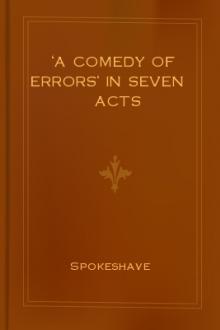Tales of St. Austin's by P. G. Wodehouse (debian ebook reader TXT) 📗

- Author: P. G. Wodehouse
Book online «Tales of St. Austin's by P. G. Wodehouse (debian ebook reader TXT) 📗». Author P. G. Wodehouse
'Look here,' he said, 'just you get out of that. What do you mean by bagging my seat?'
'Are you a director of this line?' enquired the youth politely. Roars of applause from the interested audience. Harrison began to feel hot and uncomfortable.
'Or only the Emperor of Germany?' pursued his antagonist.
More applause, during which Harrison dropped his bag of provisions, which were instantly seized and divided on the share and share alike system, among the gratified Austinians.
'Look here, none of your cheek,' was the shockingly feeble retort which alone occurred to him. The other said nothing. Harrison returned to the attack.
'Look here,' he said, 'are you going to get out, or have I got to make you?'
Not a word did his opponent utter. To quote the bard: 'The stripling smiled.' To tell the truth, the stripling smiled inanely.
The other occupants of the carriage were far from imitating his reserve. These treacherous friends, realizing that, for those who were themselves comfortably seated, the spectacle of Harrison standing up with aching limbs for a journey of some thirty miles would be both grateful and comforting, espoused the cause of the unknown with all the vigour of which they were capable.
'Beastly bully, Harrison,' said Barrett. 'Trying to turn the kid out of his seat! Why can't you leave the chap alone? Don't you move, kid.'
'Thanks,' said the unknown, 'I wasn't going to.'
'Now you see what comes of slacking,' said Grey. 'If you'd bucked up and got here in time you might have bagged this seat I've got. By Jove, Harrison, you've no idea how comfortable it is in this corner.'
'Punctuality,' said Babington, 'is the politeness of princes.'
And again the unknown maddened Harrison with a 'best-on-record' grin.
'But, I say, you chaps,' said he, determined as a last resource to appeal to their better feelings (if any), 'Mace was keeping this seat for me, while I went to get some grub. Weren't you, Mace?' He turned to Mace for corroboration. To his surprise, Mace was nowhere to be seen.
His sympathetic school-fellows grasped the full humour of the situation as one man, and gave tongue once more in chorus.
'You weed,' they yelled joyfully, 'you've got into the wrong carriage. Mace is next door.'
And then, with the sound of unquenchable laughter ringing in his ears, Harrison gave the thing up, and relapsed into a disgusted silence. No single word did he speak until the journey was done, and the carriage emptied itself of its occupants at the Junction. The local train was in readiness to take them on to St Austin's, and this time Harrison managed to find a seat without much difficulty. But it was a bitter moment when Mace, meeting him on the platform, addressed him as a rotter, for that he had not come to claim the corner seat which he had been reserving for him. They had had, said Mace, a rattling good time coming down. What sort of a time had Harrison had in his carriage? Harrison's reply was not remarkable for its clearness.
The unknown had also entered the local train. It was plain, therefore, that he was coming to the School as a new boy. Harrison began to wonder if, under these circumstances, something might not be done in the matter by way of levelling up things. He pondered. When St Austin's station was reached, and the travellers began to stream up the road towards the College, he discovered that the newcomer was a member of his own House. He was standing close beside him, and heard Babington explaining to him the way to Merevale's. Merevale was Harrison's House-master.
It was two minutes after he had found out this fact that the Grand Idea came to Harrison. He saw his way now to a revenge so artistic, so beautifully simple, that it was with some difficulty that he restrained himself from bursting into song. For two pins, he felt, he could have done a cake-walk.
He checked his emotion. He beat it steadily back, and quenched it. When he arrived at Merevale's, he went first to the matron's room. 'Has Venables come back yet?' he asked.
Venables was the head of Merevale's House, captain of the School cricket, wing three-quarter of the School Fifteen, and a great man altogether.
'Yes,' said the matron, 'he came back early this afternoon.'
Harrison knew it. Venables always came back early on the last day of the holidays.
'He was upstairs a short while ago,' continued the matron. 'He was putting his study tidy.'
Harrison knew it. Venables always put his study tidy on the last day of the holidays. He took a keen and perfectly justifiable pride in his study, which was the most luxurious in the House.
'Is he there now?' asked Harrison.
'No. He has gone over to see the Headmaster.'
'Thanks,' said Harrison, 'it doesn't matter. It wasn't anything important.'
He retired triumphant. Things were going excellently well for his scheme.
His next act was to go to the fags' room, where, as he had expected, he found his friend of the train. Luck continued to be with him. The unknown was alone.
'Hullo!' said Harrison.
'Hullo!' said the fellow-traveller. He had resolved to follow Harrison's lead. If Harrison was bringing war, then war let it be. If, however, his intentions were friendly, he would be friendly too.
'I didn't know you were coming to Merevale's. It's the best House in the School.'
'Oh!'
'Yes, for one thing, everybody except the kids has a study.'
'What? Not really? Why, I thought we had to keep to this room. One of the chaps told me so.'
'Trying to green you, probably. You must look out for that sort of thing. I'll show you the way to your study, if you like. Come along upstairs.'
'Thanks, awfully. It's awfully good of you,' said the gratified unknown, and they went upstairs together.
One of the doors which they passed on their way was open, disclosing to view a room which, though bare at present, looked as if it might be made exceedingly comfortable.
'That's my den,' said Harrison. It was perhaps lucky that Graham, to whom the room belonged, in fact, as opposed to fiction, did not hear the remark. Graham and Harrison were old and tried foes. 'This is yours.' Harrison pushed open another door at the end of the passage.
His companion stared blankly at the Oriental luxury which met his eye. 'But, I say,' he said, 'are you sure? This seems to be occupied already.'





Comments (0)